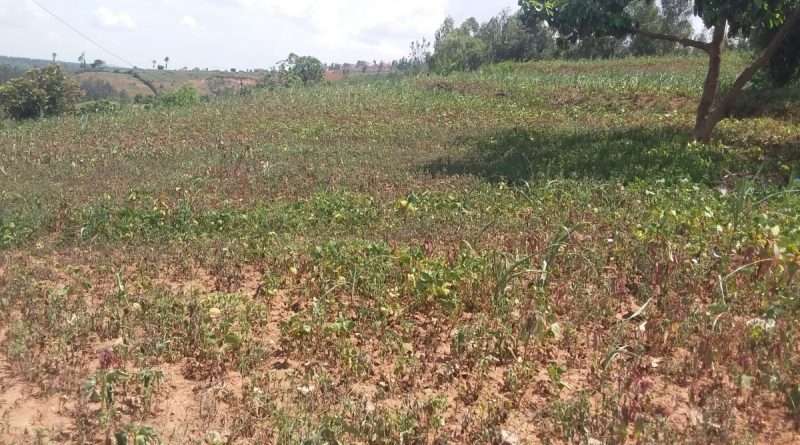Drought Challenges Impact Bean Crop Production in Rwanda
At least 78,000 hectares of bean crop farms in Rwanda faced the adverse effects of dry spells during agricultural season A, causing a significant decrease in production.
Jean Claude Izamuhaye, Head of Crop Research and Technology Transfer at the Rwanda Agriculture and Animal Resources Development Board (RAB), highlighted the sensitivity of beans to dry spells, leading to reduced yields across Southern and Eastern provinces.
Beans, a staple food in Rwanda, provide a substantial portion of household calories and protein.
The dry spells over the last two years, coupled with delayed rains, have disrupted agricultural seasons, affecting both quantity and quality of bean production.
Consequently, the scarcity has driven up bean prices, with a kilo currently ranging between Rwf1,000 and Rwf1,300 nationwide.
Data from the National Institute of Statistics of Rwanda (NISR) reveals a continuous decline in bean production. In 2020, despite an increase in cultivated hectares, production decreased by 10 percent compared to the previous year. The 2022 report indicates a further decrease of 9 percent in season A, 8.4 percent in season B, and 5 percent in season C compared to the respective seasons of 2021.
During a virtual event, Izamuhaye expressed hope for a better harvest in agricultural season B, urging farmers to adopt small-scale irrigation in areas expecting minimal rains. The Rwanda Meteorology Agency confirmed challenges in season A, with rains only arriving in November and December, affecting regions such as Kayonza, Kirehe, Bugesera, Amayaga, and Kigali City.
Looking ahead, the forecast for March to May anticipates rainfall between 600 and 300 milliliters across the country.
Some regions, including Burere, Gakenke, Musanze, and Nyaruguru, may experience heavy rains, while others like Ngoma, Bugesera, Kirehe, and Rwamagana could face reduced rains, posing potential challenges for the agriculture sector.
Despite variations, the expected rainfall is considered minimal compared to historical data spanning the past four decades.
Agroecology offers a holistic approach that can contribute to addressing the challenges faced by bean crop production in Rwanda.
1. Drought Resistance: Agroecological practices emphasize the selection and cultivation of crops adapted to local conditions. By promoting drought-resistant bean varieties, farmers can better withstand dry spells and minimize yield losses during periods of water scarcity.
2. Diversification of Crops: Agroecology encourages crop diversification, which can enhance resilience against climate variability. Integrating different crops within the farming system can help mitigate the impact of specific weather-related challenges on staple crops like beans.
3. Soil Health Management: Agroecological methods prioritize soil health through practices such as cover cropping, organic matter incorporation, and reduced tillage. Healthy soils retain moisture more effectively, improving water availability for crops during dry spells and contributing to overall sustainable production.
4. Water Management Techniques: Implementing water management techniques, including rainwater harvesting and efficient irrigation systems, aligns with agroecological principles. These practices help conserve water resources, providing farmers with the means to irrigate crops during periods of insufficient rainfall.
5. Community-Based Approaches: Agroecology often involves community collaboration and knowledge sharing. Farmers adopting agroecological practices can benefit from shared experiences, innovations, and local wisdom, fostering a collective response to challenges like drought and climate-related disruptions.
6. Reduced Dependency on Chemical Inputs: Agroecology promotes the reduction or elimination of synthetic inputs. By moving away from chemical-dependent agriculture, farmers can build ecosystems that are more resilient to environmental stressors, including the impacts of climate change.
7. Enhanced Biodiversity: Agroecological systems prioritize biodiversity, which can contribute to ecosystem stability. Diverse plant and animal species can play crucial roles in pest control, nutrient cycling, and maintaining ecological balance, contributing to sustainable and resilient farming practices.
8. Education and Extension Services: Agroecology involves farmer education and extension services to promote sustainable practices. Training farmers in climate-smart agroecological techniques can empower them to adapt to changing environmental conditions and optimize resource use.
By incorporating agroecological principles, Rwanda can build a more resilient and sustainable agricultural system, mitigating the impact of droughts on bean crop production and ensuring food security for its population.

